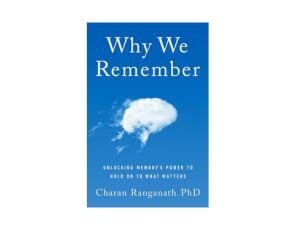How We Tend to Organize Our Memories

In this excerpt from Why We Remember, neuroscientist Charan Ranganath explains why ordinary forgetfulness isn’t a sign of decline—and why perfect recall hardly matters to our brains anyway. Plus, why nostalgia can both help us and trip us up.
When you’re late for work and frantically searching for something, such as a lost wallet, especially if you’re in a rush, you might start with a strategy based on semantic memory—by searching based on the knowledge of where you usually keep your wallet. But you can also tap into episodic memory to retrace your steps. Try to vividly remember where you were and what you were doing when you last recall having your wallet. If you can mentally time travel to the moment that you put your wallet down, the hippocampus can help you pull up other information from around the same time. The closer you can get to that context, the easier it will be to find the wallet.
Just as being in a particular place, situation, or state of mind makes it easier to access memories of other events that occurred in similar contexts, being in the wrong context can make it hard to find the right memory. Suppose you go to a party, and after a couple of glasses of wine, you find yourself deep in an animated conversation with a stranger. The next day, you run into her at the supermarket but can’t quite place who she is or how you know each other. The problem is that the hippocampus didn’t just store that person’s face in your memory, it connected it to the context—the midcentury-modern furniture in the house, your slight buzz from that second glass of merlot, and the ambient noise of dance music and party guests talking. Without any of those context cues, it can be hard to bring yourself back to a conversation you struck up with someone while you were both waiting in line for the bathroom.
The further back in time you try to go, the harder it is for your brain to pull up a past context, and in some cases you won’t be able to do it. Despite anecdotal claims to the contrary, scientific research has established that adults do not have reliable episodic memories from before the age of two. This phenomenon, known as infantile amnesia, is an enigma to scientists because very young children are fast learners and appear to be capable of forming episodic memories, but for some reason we can no longer access those experiences as we progress to adulthood. One possibility, based on research by my UC Davis colleague Simona Ghetti, is that the hippocampus is still developing during the first few years of life, so very young children lack the ability to link their experiences to specific spatial and temporal contexts. I also suspect that infantile amnesia happens because connections between neurons across the entire neocortex undergo massive reorganization during the first few years of development. It would be nearly impossible for an adult to travel back in time to infancy because our brains would have to undo years of wiring changes to get us back to the mental state we were in as babies.
You’ve probably had the experience of walking into a room and having no memory of why you went there in the first place. This doesn’t mean you have a memory problem—it’s actually a normal consequence of what memory researchers call event boundaries. When you’re in your home, you have a sense of where you are. If you step out the front door, that sense will dramatically change, even though you’ve only moved a short distance. We naturally update our sense of context when we experience a shift in our perception of the world around us, and those points mark the boundary between one event and another.
The context change that occurs with an event boundary has significant implications for episodic memory. Just as walls are physical boundaries dividing a house into separate rooms, event boundaries organize the timeline of our past experiences into manageable packets. People are better at remembering information that occurred at an event boundary than they are at remembering information from the middle of an event. Recent work from a number of labs suggests that this is because the hippocampus waits to store a memory for an event until right after an event boundary—that way, we only encode the memory once we have a full understanding of the event.
Given that our sense of context suddenly changes at event boundaries, it can sometimes be hard to recall things that occurred only moments earlier. At least once a week I find myself walking into the kitchen, scratching my head, and wondering, “What was I looking for again?” Inevitably, my frustration leads me to grab some junk food from the refrigerator, scarf it down, and walk back to my desk, only to realize as soon as I sit down that I went to the kitchen to retrieve my glasses. I’ve consumed many empty calories thanks to event boundaries.
Event boundaries happen all the time and don’t necessarily require a change in location. Anything that alters your sense of the current context— a shift in the topic of conversation, a change in your immediate goals, or the onset of something surprising—can lead you to put up an event boundary. You’ve likely experienced this if you’ve ever been in the middle of telling a story and someone interrupted your train of thought, say, to point out your shoe was untied, and you forgot entirely what you were about to say. It can be frustrating—even alarming as we approach middle age and beyond— to have to ask, “What were we talking about?” But rest assured, it’s a normal by-product of the way our brains use context to organize episodic memories.
Beyond causing these quirks in forgetting, event boundaries can also affect our sense of the passage of time. In 2020, millions of people all over the world endured months of lockdowns during the first wave of the coronavirus pandemic. The monotony of spending all day, every day in the same place, deprived of the usual activities that would normally provide structure to our daily lives, such as school schedules and work commutes, left many of us feeling as if we were no longer anchored in time and space. To get a sense of the time warp that people were experiencing, I polled the 120 students in my (online) Human Memory class about how they were experiencing the passage of time. After spending almost an entire semester stuck in the same room, staring at a computer screen, binge-watching television shows or attending online classes and lectures, an overwhelming majority (95 percent) said they felt that the days were going by slowly. Yet, without distinctive memories of what was happening during those days, most of them (80 percent) also felt that the weeks were passing by too quickly.
With few event boundaries to provide meaningful structure to their lives, my students—along with millions of other people all over the world—felt as if they were living in the twilight zone, floating aimlessly through time and space.
Making the most of mental time travel
Nostalgia, that bittersweet mixture of joy and sadness that infuses so many of our most precious memories, is one of the most powerful ways episodic memory influences our everyday lives. On average, people find it easier to recall positive experiences than negative ones, and this positivity bias increases as we get older.
An abundance of research suggests reliving happy experiences can improve our mood and self-confidence, and therefore our optimism about the future. A simple context cue can transport us back to a happier time, perhaps even changing our perspective and shifting how we see ourselves and our place in the world.
When we look back at the past, we tend to focus on a specific period of our lives, between the ages of 10 and 30. The predominance of memories from these years is called the reminiscence bump, and it isn’t just apparent when we ask people to recall events from their lives; it also shows up indirectly when people rattle off lists of favorite movies, books, and music. Something about listening to a song or watching a movie from those formative years can give us a sense of meaning, connecting us to an idealized sense of who we are.
Although nostalgia can make us happy, it can also have the opposite effect, depending on the memories we choose to reflect upon and the way in which we make sense of them. The term nostalgia was coined by a Swiss physician in the late seventeenth century to describe the particular kind of anxiety disorder he observed in mercenary soldiers living far from home. For them, memories of good times in a familiar place only highlighted their unhappiness in the present. More recently, researchers found that, if people felt lonely in their daily lives, engaging in nostalgia left them feeling even more isolated and alone. In other words, the cost of nostalgia is that it can leave us feeling disconnected from our lives in the present, giving us a sense that things aren’t as they were in the “good old days.”
Rumination—repeatedly circling back to negative events and spinning your wheels— is the evil twin of nostalgia, and a prime example of how not to use episodic memory. People who have been identified as having Highly Superior Autobiographical Memory because they can pull up detailed recollections for seemingly trivial experiences from the distant past tend to ruminate too much. As one such individual put it, “I do tend to dwell on things longer than the average person, and when something painful does happen, like a breakup or the loss of a family member, I don’t forget those feelings.”
To benefit from mental time travel, it’s helpful to think about why the human brain evolved that capability in the first place: to learn from singular experiences. When we travel to past contexts, we can access experiences that reorient our view of the present. Recalling negative events can remind us of past lessons we have learned, so we can make better decisions in the present. Recalling positive events can help us to be better, by increasing altruism and compassion. In one study, people who vividly recalled an event in which they helped someone were more empathetic to the plight of others and expressed more willingness to help a person in need. By recalling past moments of compassion, wisdom, perseverance, or courage, we can use our connection with the past to broaden our sense of what we can do and who we can be.

Adapted from Why We Remember: Unlocking Memory’s Power to Hold On to What Matters by Charan Ranganath, PhD. Copyright ©2024 by Charan Ranganath. Published in Canada by Doubleday Canada, a division of Penguin Random House Canada Limited.




